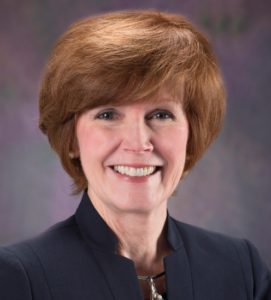“It’s exciting how the body heals itself after giving up smoking,” Harvey said.
Lung cancer screening uses low-dose computed tomography (LDCT) to produce detailed images of the chest and lungs and detect lung cancer early, when it’s most curable.
“Early-stage lung cancer has about an 80% chance of cure, or survival, over five years,” said Jennifer Harvey, RN, Nurse Navigator, Lung Cancer Screening and Care at Dignity Health, Yavapai Regional Medical Center (YRMC). “That is huge.”
November is Lung Cancer Awareness Month, a good time to explore the benefits of this lifesaving program. Here are just a few:
There’s even more data demonstrating that lung cancer screening works.
Thanks to its success, lung cancer screening now begins at a younger age and includes people who have smoked less. The latest Medicare screening guidelines include people who are:
- Ages 50-77
- Heavy smokers (one pack a day for 20 years or the equivalent)
- Current smokers or smokers who have quit in the last 15 years
- Free of any lung cancer symptoms
“Lowering both the qualifying age for screening to 50 years old (from 55), and the pack-per-day elgibility allows for more individualized risk assessment,” Harvey said. “For example, someone who has a strong family history of lung cancer, or other risk factors, is now eligible for screening at a younger age.”
Top physician organizations recommend lung cancer screening.
The American Academy of Family Physicians (AAFP) – one of the largest physician organizations in the United States – is the latest to endorse lung cancer screening. The organization’s leaders point to mounting evidence that lung cancer screening works. The AAFP also supports the expanded criteria, which makes lung cancer screening available to more minority populations who may have fewer “pack years” but are at higher risk for lung cancer.
Lung Cancer Screening and Care at Dignity Health, YRMC is a dedicated healthcare partner.
That partnership begins by ensuring you qualify for lung cancer screening. Additionally, our nurse navigator is available to answer questions about LDCT and lung health.
Harvey reaches out to every Lung Cancer Screening and Care participant to remind them of their annual lung cancer screening. That year-to-year continuity is an important aspect of Lung Cancer Screening and Care.
“Lung cancer screening is not a one and done,” said Harvey. “If you don’t have any signs of lung cancer after your first screening, you will be screened annually. I suggest that people think of their LDCT as they would a mammogram or colonoscopy. It’s a screening that you need even – and especially – if you have no symptoms.”
If a patient’s lung cancer screening findings are suspicious, a follow-up scan may be scheduled. The Lung Cancer Screening and Care team may also recommend a biopsy, in which case the patient would be referred to a procedural pulmonologist or a radiologist. If surgery is needed, the Lung Cancer Screening and Care team also includes a cardiothoracic surgeon.
LDCT not only detects lung cancer early, but it can discover other potentially life-threatening illnesses before you’re experiencing symptoms.
LDCT scans include a large part of the body. This means in addition to lung cancer, LDCT can also detect chronic pulmonary obstructive disorder (COPD) and heart disease, for example.
If you’re a longtime smoker who wants to quit, you’ll receive support from Lung Cancer Screening and Care.
The health benefits of giving up smoking are substantial:
One year after quitting smoking, a person’s risk for coronary heart disease decreases 50 percent.
After 10 years, a person’s chances of developing lung cancer and dying from it are cut in half compared to someone who continues smoking.
“It’s exciting how the body heals itself after giving up smoking,” Harvey said. “After someone quits, it’s recommended that they continue annual lung screening for at least 15 years. After that, their chance of developing lung cancer drops significantly.”
How do you get help quitting? The Arizona ASHLine sponsors a customized program called Quit Coaching. You’ll find information at AZDHS.org/ashline or by calling 1-800-556-6222.
Want to learn more about Lung Cancer Screening and Care? Speak to your healthcare provider or contact us at 928-771-5454. QCBN
By Bridget O’Gara
Bridget O’Gara is a writer, communications strategist and project manager who specializes in health care. O’Gara has spent her career writing about healthcare topics. She works with mission-driven healthcare organizations, including hospitals, other healthcare providers and advocacy organizations.







Leave a Reply